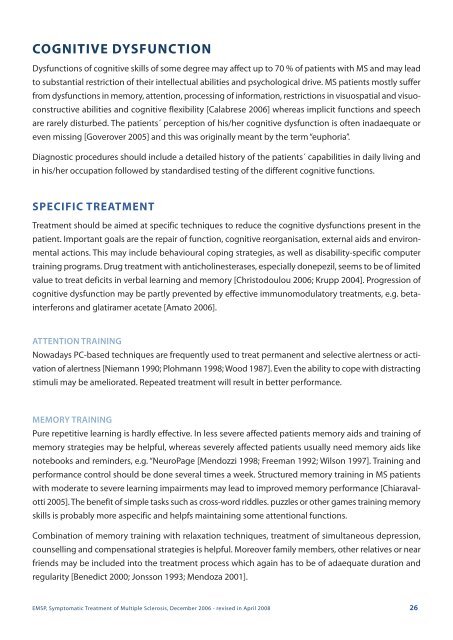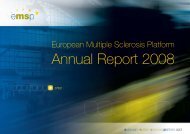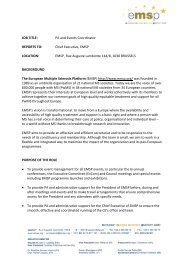Symptomatic Treatment of MS - European Multiple Sclerosis Platform
Symptomatic Treatment of MS - European Multiple Sclerosis Platform
Symptomatic Treatment of MS - European Multiple Sclerosis Platform
Create successful ePaper yourself
Turn your PDF publications into a flip-book with our unique Google optimized e-Paper software.
COGNITIVE DYSFUNCTION<br />
Dysfunctions <strong>of</strong> cognitive skills <strong>of</strong> some degree may affect up to 70 % <strong>of</strong> patients with <strong>MS</strong> and may lead<br />
to substantial restriction <strong>of</strong> their intellectual abilities and psychological drive. <strong>MS</strong> patients mostly suffer<br />
from dysfunctions in memory, attention, processing <strong>of</strong> information, restrictions in visuospatial and visuoconstructive<br />
abilities and cognitive flexibility [Calabrese 2006] whereas implicit functions and speech<br />
are rarely disturbed. The patients´ perception <strong>of</strong> his/her cognitive dysfunction is <strong>of</strong>ten inadaequate or<br />
even missing [Goverover 2005] and this was originally meant by the term “euphoria”.<br />
Diagnostic procedures should include a detailed history <strong>of</strong> the patients´ capabilities in daily living and<br />
in his/her occupation followed by standardised testing <strong>of</strong> the different cognitive functions.<br />
SPECIFIC TREATMENT<br />
<strong>Treatment</strong> should be aimed at specific techniques to reduce the cognitive dysfunctions present in the<br />
patient. Important goals are the repair <strong>of</strong> function, cognitive reorganisation, external aids and environmental<br />
actions. This may include behavioural coping strategies, as well as disability-specific computer<br />
training programs. Drug treatment with anticholinesterases, especially donepezil, seems to be <strong>of</strong> limited<br />
value to treat deficits in verbal learning and memory [Christodoulou 2006; Krupp 2004]. Progression <strong>of</strong><br />
cognitive dysfunction may be partly prevented by effective immunomodulatory treatments, e.g. betainterferons<br />
and glatiramer acetate [Amato 2006].<br />
ATTENTION TRAINING<br />
Nowadays PC-based techniques are frequently used to treat permanent and selective alertness or activation<br />
<strong>of</strong> alertness [Niemann 1990; Plohmann 1998; Wood 1987]. Even the ability to cope with distracting<br />
stimuli may be ameliorated. Repeated treatment will result in better performance.<br />
MEMORY TRAINING<br />
Pure repetitive learning is hardly effective. In less severe affected patients memory aids and training <strong>of</strong><br />
memory strategies may be helpful, whereas severely affected patients usually need memory aids like<br />
notebooks and reminders, e.g. “NeuroPage [Mendozzi 1998; Freeman 1992; Wilson 1997]. Training and<br />
performance control should be done several times a week. Structured memory training in <strong>MS</strong> patients<br />
with moderate to severe learning impairments may lead to improved memory performance [Chiaravalotti<br />
2005]. The benefit <strong>of</strong> simple tasks such as cross-word riddles. puzzles or other games training memory<br />
skills is probably more aspecific and helpfs maintaining some attentional functions.<br />
Combination <strong>of</strong> memory training with relaxation techniques, treatment <strong>of</strong> simultaneous depression,<br />
counselling and compensational strategies is helpful. Moreover family members, other relatives or near<br />
friends may be included into the treatment process which again has to be <strong>of</strong> adaequate duration and<br />
regularity [Benedict 2000; Jonsson 1993; Mendoza 2001].<br />
E<strong>MS</strong>P, <strong>Symptomatic</strong> <strong>Treatment</strong> <strong>of</strong> <strong>Multiple</strong> <strong>Sclerosis</strong>, December 2006 - revised in April 2008 26






